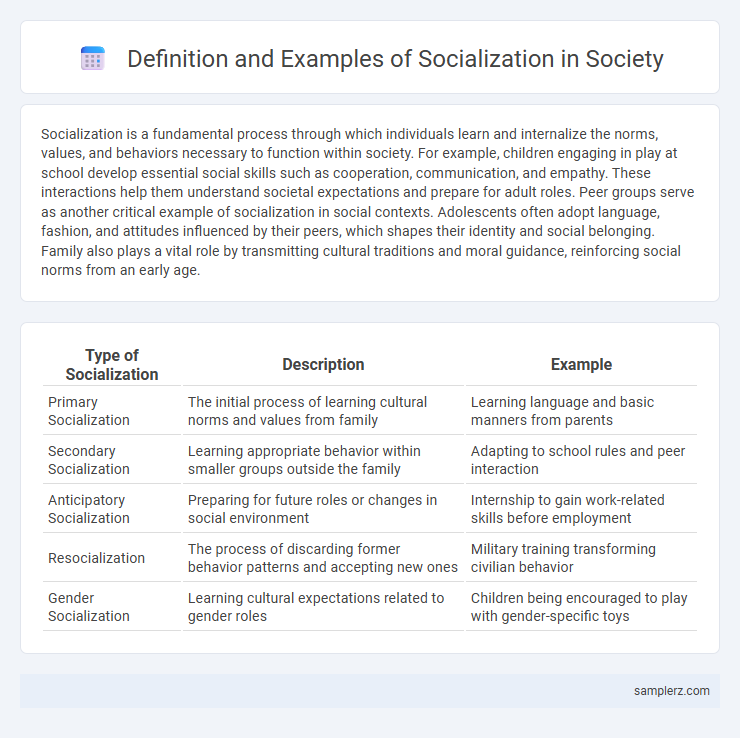Socialization is a fundamental process through which individuals learn and internalize the norms, values, and behaviors necessary to function within society. For example, children engaging in play at school develop essential social skills such as cooperation, communication, and empathy. These interactions help them understand societal expectations and prepare for adult roles. Peer groups serve as another critical example of socialization in social contexts. Adolescents often adopt language, fashion, and attitudes influenced by their peers, which shapes their identity and social belonging. Family also plays a vital role by transmitting cultural traditions and moral guidance, reinforcing social norms from an early age.
Table of Comparison
| Type of Socialization | Description | Example |
|---|---|---|
| Primary Socialization | The initial process of learning cultural norms and values from family | Learning language and basic manners from parents |
| Secondary Socialization | Learning appropriate behavior within smaller groups outside the family | Adapting to school rules and peer interaction |
| Anticipatory Socialization | Preparing for future roles or changes in social environment | Internship to gain work-related skills before employment |
| Resocialization | The process of discarding former behavior patterns and accepting new ones | Military training transforming civilian behavior |
| Gender Socialization | Learning cultural expectations related to gender roles | Children being encouraged to play with gender-specific toys |
Family Gatherings: Foundations of Social Interaction
Family gatherings serve as critical platforms for socialization, where individuals reinforce bonds and exchange cultural values. These events nurture communication skills, empathy, and cooperation, forming the foundation of interpersonal relationships. Through shared experiences, family members develop social norms and emotional support networks essential for community cohesion.
School Environment: Peer Socialization in Action
Peer socialization in the school environment plays a crucial role in shaping students' social skills, attitudes, and behavior patterns. Interaction with classmates during group projects, recess, and extracurricular activities promotes communication, cooperation, and conflict resolution abilities. These social experiences contribute significantly to emotional development and a sense of belonging within the school community.
Workplace Culture: Building Professional Relationships
Workplace culture fosters socialization by encouraging collaboration and open communication among colleagues, which enhances team cohesion and productivity. Building professional relationships through regular interactions, such as meetings and team-building activities, creates trust and mutual respect essential for a positive work environment. These social connections improve job satisfaction and support career development within the organization.
Community Events: Fostering Social Bonds
Community events serve as vital platforms for socialization, bringing individuals together to share experiences and strengthen social bonds. Activities such as neighborhood festivals, charity runs, and cultural celebrations encourage collaboration, communication, and mutual support among participants. These events cultivate a sense of belonging and collective identity, essential for cohesive and resilient communities.
Online Communities: Virtual Socialization Trends
Online communities exemplify virtual socialization trends, where individuals connect through shared interests and goals across digital platforms such as Reddit, Discord, and Facebook Groups. These virtual spaces facilitate real-time interactions, collaborative projects, and emotional support, fostering a sense of belonging despite physical distance. Socialization in these environments promotes diverse cultural exchanges and the development of digital communication skills.
Sports Teams: Learning Cooperation and Teamwork
Sports teams serve as prime examples of socialization by teaching individuals cooperation and teamwork through shared goals and coordinated effort. Players develop communication skills and trust while navigating diverse roles and strategies essential for collective success. This process enhances social bonds and reinforces group identity, critical components in social development.
Religious Ceremonies: Shared Rituals and Values
Religious ceremonies serve as powerful examples of socialization by reinforcing shared rituals and values within a community, fostering a collective identity and social cohesion. These ceremonies transmit cultural norms, ethical beliefs, and communal traditions across generations, strengthening social bonds and ensuring continuity. Participation in religious rituals facilitates interpersonal connections and a sense of belonging, essential for individual and group social development.
Volunteer Activities: Connecting Through Altruism
Volunteer activities foster socialization by creating opportunities for individuals to collaborate on community projects, enhancing interpersonal communication and teamwork skills. Participating in altruistic efforts promotes empathy and cultural understanding, bridging social divides and building inclusive networks. These shared experiences strengthen social bonds and encourage a collective commitment to social responsibility.
Friendship Circles: Informal Social Development
Friendship circles serve as fundamental frameworks for informal social development, enabling individuals to practice communication skills, empathy, and conflict resolution within a supportive environment. These peer groups foster a sense of belonging and identity, essential for emotional growth and social competence. Through shared activities and mutual support, friendship circles accelerate the development of social norms and collaborative behaviors crucial for community integration.
Cultural Festivals: Celebrating Diversity Together
Cultural festivals serve as vibrant platforms for socialization, where diverse communities gather to share traditions, music, dance, and cuisine, fostering mutual understanding and respect. Events like Diwali, Carnival, and Hanami encourage intercultural dialogue and strengthen social bonds by celebrating unique cultural identities in a collective space. These festivals play a crucial role in promoting inclusivity and preserving cultural heritage within multicultural societies.

example of socialization in social Infographic
 samplerz.com
samplerz.com